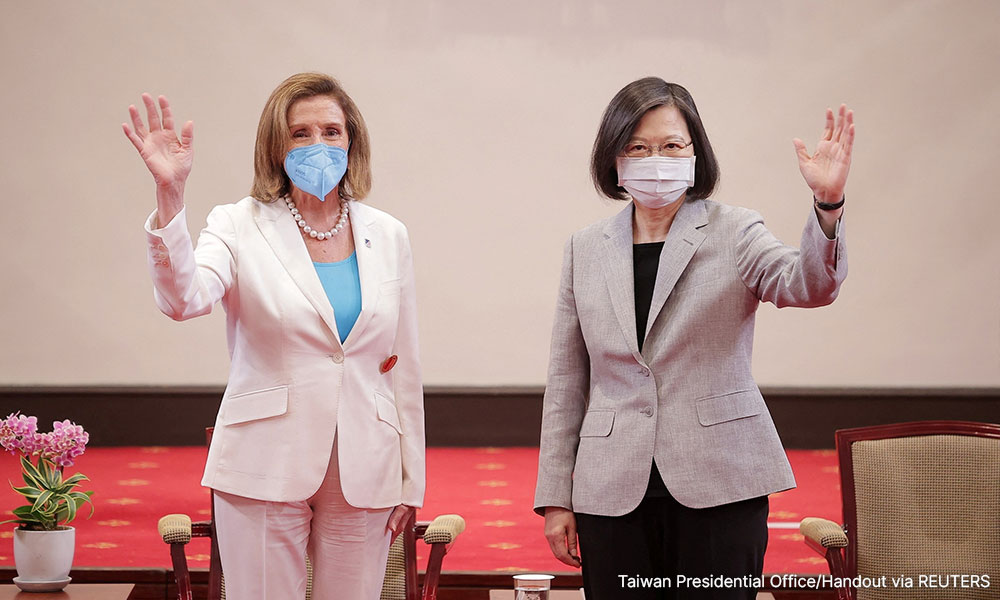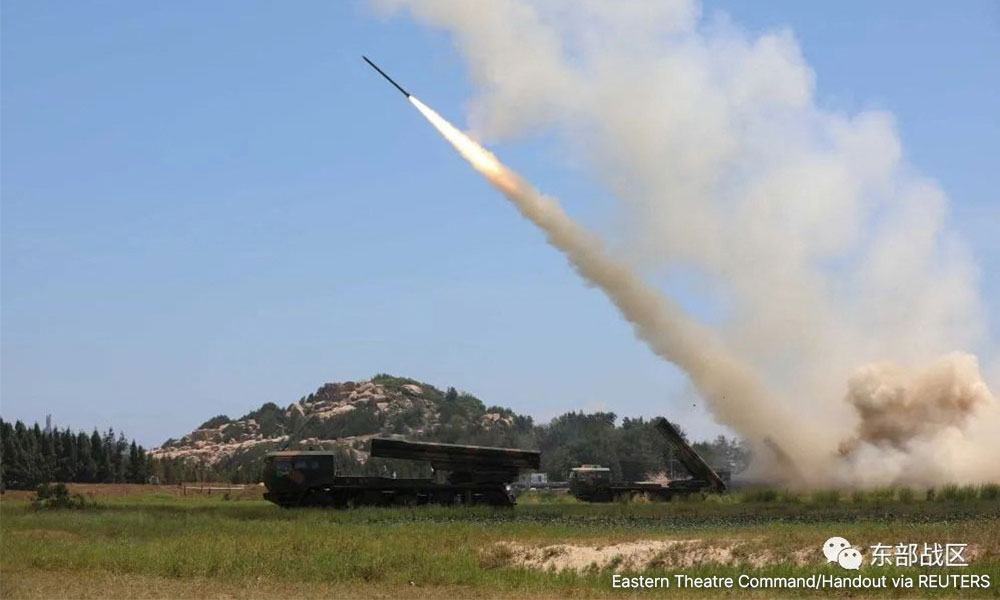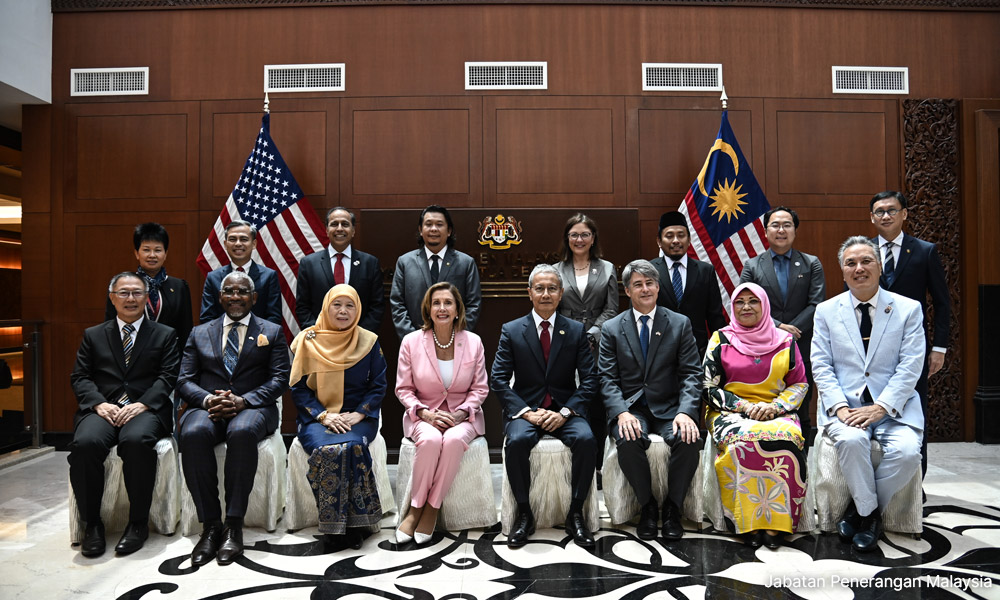When China issued a warning and threatened action if US House of Representatives Speaker Nancy Pelosi did not cancel her planned visit to Taiwan, did China expect the US to cower and cancel the visit in deference to China’s wishes?
Or would the US interpret it as a blatant, outrageous attempt to control its right to visit any place it wanted to further its own interests and strengthen ties with long-standing friends, especially when it was welcomed with joy and open arms by its hosts?
Events have answered the questions for us and no matter how China and its worldwide brigade try to present things to water down the battering of China’s international image, the unmistakable conclusion is that China blinked and backed down.
What is unsettling in this sorry, needless, episode on the world political and military stage, with an outside possibility of war if anything happened to Pelosi, is that the Chinese can misread US intentions to go ahead with the visit so wrongly.
Did China’s president Xi Jinping think that by making such threats he could stop the world’s most powerful country from exercising its legitimate right to visit what is effectively an independent nation of 23 million people with which the US has had very long historical links buttressed by an alignment of economic interests dating back many decades?
Look at this warning issued by China days before Pelosi’s visit. "If the US insists on going down the wrong path, China will definitely take resolute and forceful measures to firmly defend its national sovereignty and territorial integrity," ministry spokesperson Zhao Lijian told a news conference. "The United States must be fully responsible for all the consequences caused by this."
That is a barely disguised threat of even violence if Pelosi went ahead with the visit and to think that the US would buckle to such a threat is great folly indeed. What if China, in a face-saving gesture, resorted to violence? What if Pelosi’s plane was shot down? Imagine the consequences.

That Xi could even contemplate something like that indicates that his quest for international power and recognition, which includes regular incursions into areas in the South China Sea controlled by countries such as Vietnam, Thailand, Philippines and even Malaysia, can get quite dangerous.
His handling of Covid-19 and his bizarre zero-Covid policy has come under severe criticism by no less than the World Health Organisation or WHO. It has caused economic and other hardship to over 60 million people and part of the reason may be the reluctance to use more effective Western-produced vaccines instead of the less effective Chinese ones.
Xi’s increasing xenophobia of anything Western and seeming urge to position China at the helm of world power before its time can cause problems. Taiwan is a rather unusual situation which has to be dealt with differently.
One-party state for 40 years
Control of the island - at one time called Formosa - with associated smaller ones, passed back and forth between nations such as Portugal, Netherlands and Japan without any large Chinese population on the island. Japan seized it after the Sino-Japanese war of 1895, ceding control to China after the Second World War.
According to Wikipedia, an account which can easily be corroborated elsewhere, in 1949, after losing control of mainland China in the Chinese civil war, the Kuomintang government withdrew to Taiwan and its leader Chiang Kai-shek declared martial law, beginning the era of some form of ethnic Chinese control.
The Kuomintang ruled Taiwan as a single-party state for 40 years until democratic reforms in the 1980s, which led to the first-ever direct presidential election in 1996. During the post-war period, Taiwan experienced rapid industrialisation and economic growth known as the "Taiwan Miracle", and was known as one of the "Four Asian Tigers".
Despite the communist victory in China in 1949, Taiwan effectively represented China in the UN Security Council which was set up in 1945 with the formation of the United Nations. With four others - the US, France, Britain and the Soviet Union - Taiwan had veto powers on UN decisions. This was a ridiculous piece of injustice given that Taiwan was taken to be a representative of all of China.
That changed in October 1971, when Resolution 2758 was passed by the UN General Assembly and "the representatives of Chiang Kai-shek" (and thus the ROC) were expelled from the UN and replaced as "China" by the PRC (People's Republic of China). In 1979, the United States switched recognition from Taipei to Beijing, says Wikipedia.

For some 22 years, Taiwan wrongly represented China at the United Nations wielding way too much power than it actually had - control of a small island off the coast of China and less than 20 million people instead of China’s colossal land mass and over one billion people even then.
But such is international diplomacy. If the world capitulates to China’s claim that Taiwan, independent for nearly three quarters of a century, should become part of China, it will be perpetuating yet another instance of severe injustice.
The truth of the matter is that Taiwan has now been independent from 1949, a period of 73 years - it has its own administration, its own government and, since 1996, its own elections. It has a population of 23 million people and has a strong and dynamic economy and is the world’s largest producer of semiconductor chips.
If it is to return to China now, common sense - sadly lacking in international diplomacy - and basic human rights dictate that it should be done via a public referendum which reflects the will of the people. Otherwise, the international community should leave it well alone. Just because President Xi, a despot who has declared himself president for life of China, wants it to be part of China, it should not be so.
Doing what’s best for M’sia
For countries such as Malaysia, caught between two spheres of influence, it’s a rather delicate situation, to say the least. We should keep all our options and defend our sovereign right to make decisions which are best for our country and people.
We should take care not to capitulate to either Chinese or Western interests but act to further our own interests. We should resist all attempts to interfere in our internal affairs, especially in politics, but also in the economic sphere where there have been rather blatant attempts by China to support a corrupt leadership as I explained here and here.

Organisations and people like the MCA and our special envoy to China should refrain from making statements which are prejudicial to the national interest by supporting China’s stand. We don’t need to get caught in that argument.
It is right that our foreign minister has explained that these views don’t represent those of the nation. Pelosi has a right to visit Malaysia and to visit Taiwan, which for all practical purposes is an independent nation.
There is nothing wrong with Pelosi’s visit to Taiwan - it's a meeting of old, long-standing friends. Let’s maintain a guarded perspective over this issue and not be needlessly influenced by either side.
Our own interests come foremost. - Mkini
P GUNASEGARAM, a former editor at online and print news publications, and head of equity research, is an independent writer and analyst.
The views expressed here are those of the author/contributor and do not necessarily represent the views of MMKtT




No comments:
Post a Comment
Note: Only a member of this blog may post a comment.